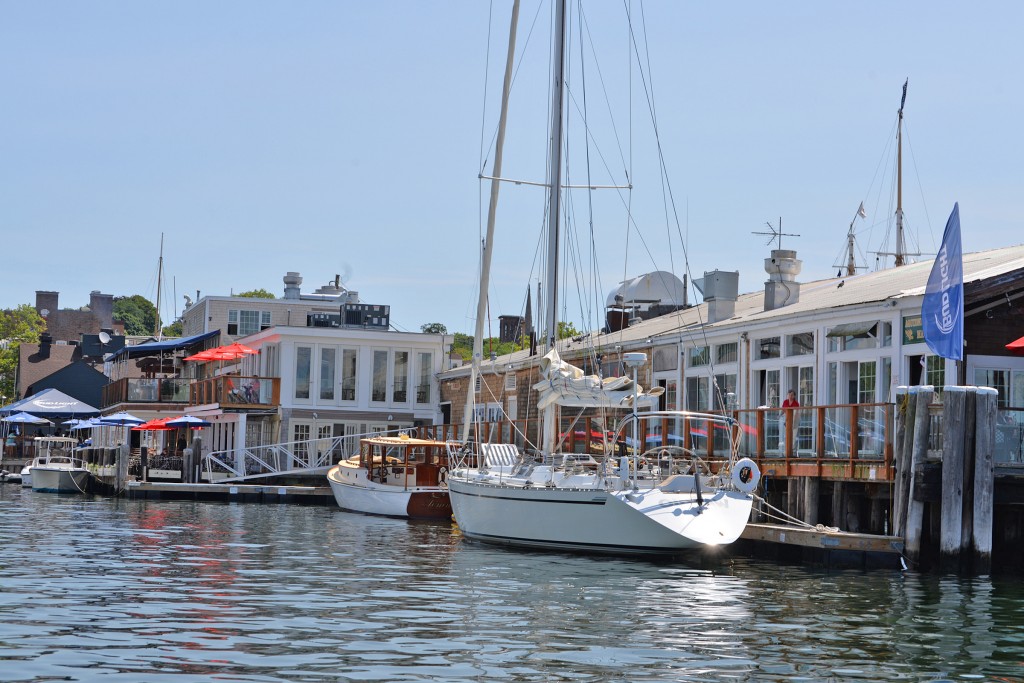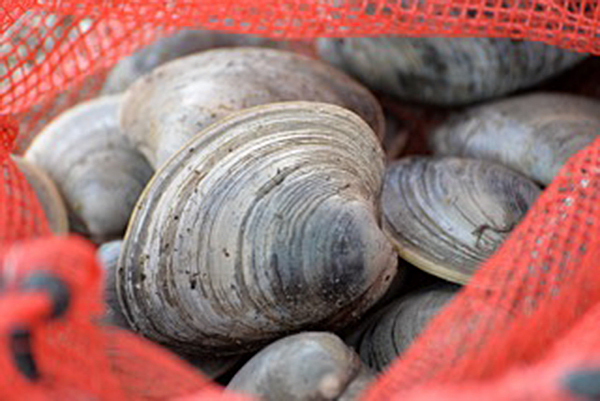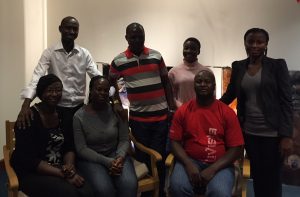 The University of Rhode Island Coastal Resources Center (URI CRC) is proudly hosting seven graduate students from Africa, with affiliations at several colleges, who are, with CRC guidance, pursuing URI master’s and doctoral degrees in varied fields to ultimately help build the capacity of their own communities to engage in innovative coastal management planning and practice. CRC is engaged in extensive coastal management and fisheries related projects in the countries of Ghana and Malawi; bolstering the professional development of emerging leaders and in-country practitioners is a critical aspect of the work — a focus emphasized by URI President David M. Dooley at his recent meeting with University of Cape Coast/Ghana (UCC) leadership to initiate a learning exchange between the schools. Funding for the graduate student effort is provided by the U.S. Agency for International Development (USAID). While one student, Evans Arizi of Ghana, is already well underway with his URI study program, six more are embarking this semester. From Ghana: Rosina Cobbina, Ivy Gyimah, Vida Osei and Evelyn Takyi. From Malawi: Innocent Gumulira and Elliot Lungu. Please join CRC in extending a warm welcome to this student group.
The University of Rhode Island Coastal Resources Center (URI CRC) is proudly hosting seven graduate students from Africa, with affiliations at several colleges, who are, with CRC guidance, pursuing URI master’s and doctoral degrees in varied fields to ultimately help build the capacity of their own communities to engage in innovative coastal management planning and practice. CRC is engaged in extensive coastal management and fisheries related projects in the countries of Ghana and Malawi; bolstering the professional development of emerging leaders and in-country practitioners is a critical aspect of the work — a focus emphasized by URI President David M. Dooley at his recent meeting with University of Cape Coast/Ghana (UCC) leadership to initiate a learning exchange between the schools. Funding for the graduate student effort is provided by the U.S. Agency for International Development (USAID). While one student, Evans Arizi of Ghana, is already well underway with his URI study program, six more are embarking this semester. From Ghana: Rosina Cobbina, Ivy Gyimah, Vida Osei and Evelyn Takyi. From Malawi: Innocent Gumulira and Elliot Lungu. Please join CRC in extending a warm welcome to this student group.
Blog Archives
US Ambassador Jackson calls on Fisher folk in Ghana to Allow Children to Grow in their Home Environment and Develop Well
“Just like fish, Big is Good; Small is Bad!”
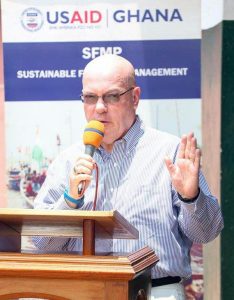
August 12, 2016 – The United States Ambassador to Ghana, Robert P Jackson on Friday, appealed to fisher folk in Elmina, an important fishing port in the Central Region, to maintain children in their home environment with their families and offer them good education instead of trafficking them into child labor-related activities that affect their health and ability to develop properly in life. Ambassador Jackson made the call when he visited the fishing community, which is a focal site of the USAID-funded Sustainable Fisheries Management Project (SFMP), implemented by the Coastal Resources Center (CRC) at the Graduate School of Oceanography, University of Rhode Island.
He interacted with fisher folk and anti-Child Labor Advocates in the Elmina port area and neighboring fishing communities where the project is implementing a behavior change communications campaign against child labor and trafficking in the fisheries sector. This work is supported by the US Government global Feed the Future Initiative.
Mr. Jackson was accompanied by the Mission Director of the United States Agency for International Development – USAID/Ghana – Andrew Karas and other US Government officials.
In 2016, Ghana has for two years in a row been classified as a Tier 2 Watch List Country by a US State Department as detailed in the most recent Trafficking in Persons Report; which concluded that the Government of Ghana does not meet all the minimum requirements for the elimination of trafficking in persons. Under US law, a classification for a third year in a row could result in significant reductions in US foreign assistance to Ghana.
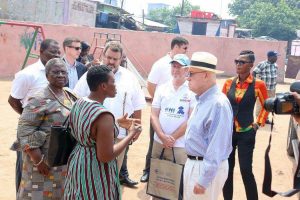
Consequently, the Ambassador’s visit to the SFMP focal site was intended to learn more about this issue in the fisheries sector the related SFMP project interventions to combat this problem in the Central Region; a region noted as source communities for child recruitment into fisheries-related child labor and trafficking activities.
The Chief of Party of the project, Dr. Brian Crawford, who is also a senior manager at CRC, noted that child labor and trafficking in fisheries had worsened due to declining fish harvests and increasing poverty in coastal fishing communities where there are hardly any other viable forms of livelihoods. “Female-headed single-parent households with large families are most vulnerable to child labor and trafficking activities; and many parents give their children away to others for a fee, oblivious to the maltreatment meted out to the children”, noted Dr. Crawford. Many of these children are forced into dangerous fisheries labor practices and are not kept in school, which is illegal under Ghana law.
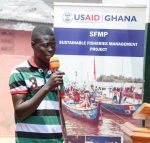
Participants in the visit, organized by the Central and Western Region Fishmongers Improvement Association, included child labor and trafficking victims, who have now become advocates as a result of the project intervention, narrated life threatening experiences as victims and related success stories after benefiting from Advocacy Training on child labour and trafficking.
“As it is with fish, so it is with children. Big is Good; Small is Bad! Just as we should not harvest the juvenile fish, so must we leave children in their environment and homes with their families to enjoy education, and so on; so they can develop well instead of sending them away into child labor”, stressed Ambassador Jackson.
Experts Converge for Newport Resilience Assessment Tour
Increased outreach and education, financial incentives and ease of implementation could help waterfront businesses strengthen their resiliency to climate change and sea-level rise impacts and, ultimately, strengthen their bottom lines. Those were some of the messages delivered at last week’s Newport Resilience Assessment Tour led by the Coastal Resources Center (CRC) at the University of Rhode Island’s Graduate School of Oceanography.
The assessment tour was part of CRC’s Climate Change Adaptation for Municipalities: Newport, R.I., project. CRC and partner Rhode Island Sea Grant assembled a team of experts to examine three waterfront pilot sites, assess their resilience and make recommendations for strengthening. The team included representatives from universities and government bodies as well as professionals from the insurance, disaster management and architecture fields. They assessed properties along the Newport Harbor with diverse uses and conditions.
The goal was to help Newport’s waterfront business sector (for profit and non-profit alike) continue to become more resilient to sea level rise, storm damage and climate change impacts. The knowledge gained and lessons learned will inform good practices and recommendations for the pilot sites that can then be replicated elsewhere in the city, state and beyond, said Pam Rubinoff, CRC coastal manager and a project leader.
One message coming out of the tour was that while resilience certainly can be designed and built into new structures, existing properties and environs also can be strengthened in cost-effective ways. “If you can do a little bit now, what that it is going to save you is monumental,” said Dan Goulet of Rhode Island’s Coastal Resources Management Council and an assessment team member. These measures can pay off not only by minimizing damage in a storm or flood of today (and high tides in the future with accelerated sea level rise), but by ensuring that an entity can operate without interruption after such an event. Tie-downs for rooftop equipment, properly protected utility hookups and water-permeable features for parking lots and streetscapes were among the examples shared.
Before any resilience strengthening can occur, however, businesses, municipalities and the public need to be made aware and educated. “We need to work across disciplines and get our messages out to different audiences,” said Teresa Crean, CRC coastal manager. Bill Coulbourne, a structural engineer from Delaware who has actively participated in post-storm assessments including Sandy and Katrina and was a Newport assessment team member, agreed: “This is not one size fits all. Outreach is important; make it easy for businesses to engage.”
Otherwise, lack of information can have a steep price, literally. He noted that up to 15 percent of federal funds awarded to a state in the wake of a disaster can be used for mitigation projects. Unfortunately, many communities don’t know that such incentives are available and how best to access them. Funds that go unused must be returned to the federal government.
The Newport team currently is preparing summary reports for each of the pilot sites and will share knowledge gained from the assessments with the business owners and other waterfront entities in the fall. Businesses and community waterfront actions will be highlighted at the Ronald C. Baird Sea Grant Science Symposium in December, Staying Afloat: Adapting Waterfront Businesses to Rising Seas and Extreme Storms. Pilot activities will be reviewed during a follow-up project related to green infrastructure capacity building in Newport, North Kingstown and Warwick starting in January. The Newport Assessment Tour was funded by the van Beuren Charitable Foundation, 11th Hour Racing and the Prince Charitable Trust.
A Celebration 2 Years in the Making: R.I. Shellfish Management Plan Completed
State agencies, project managers, researchers, stakeholders and funders celebrated Rhode Island’s first comprehensive shellfish management plan Monday night at the University of Rhode Island. The plan is the result of two years of work by this diverse group of Rhode Islanders who came together to make the concept of a Shellfish Management Plan (SMP) a reality.
The SMP, which is the purview of the state’s Department of Environmental Management and Coastal Resources Management Council, along with the Department of Health, guides the management of shellfish harvest, culture, restoration, and safe handling.
Hailing the planning process, with its partnership among state agencies, private funders, and university staff and scientists as a “model” for addressing environmental issues in Rhode Island, URI Graduate School of Oceanography Dean Bruce Corliss said the plan would have “a significant impact on Rhode Island’s economy and well being in the years to come.”
Development of the plan was instigated by the DEM and the CRMC, and facilitated by the URI Coastal Resources Center (CRC) and Rhode Island Sea Grant, which also funded $1.2 million in research projects to help fill in some of the missing data on shellfish ecology on which to base policy decisions.
Jennifer McCann, director of U.S. Coastal Programs for CRC and extension for Rhode Island Sea Grant, said that early discussion with stakeholders brought forth recommendations that the plan improve coordination among state agencies, improve communication between regulators and the shellfishing industry, and incorporate more science into management discussions, among others.
Grover Fugate, executive director of the CRMC, said that the plan was “a real opportunity to educate and inform everyone – not just the public, but the agency staffs” and has led to cooperation among DEM, CRMC, and the Department of Health. He pointed to new memoranda of understanding that “reduce redundancy, streamline processes, and improve management of the resource overall.”
DEM Director Janet Coit called the plan “a living document” that is going to be “refined, added to, and updated almost immediately.” She added that the night’s ceremony represented “an end of the plan and hopefully the beginning of a Rhode Island Shellfish Initiative,” which would include the implementation of the plan and incorporation of ongoing research.
At the ceremony, project manager Azure Cygler, who received a standing ovation for her work on the plan, presented awards to members of industry and other stakeholders who had contributed significantly to the plan’s development. Michael McGiveney, president of the R.I. Shellfisherman’s Association and recipient of one of the awards, said of those present, “It’s great that people care about the shellfish industry as much as the people who do it.”
Project Documents and Video Available
Judith Swift, director of the URI Coastal Institute, which supported the development of the plan, announced the forthcoming book that sprang from the efforts of the plan to capture the “human dimension” in a “marriage of science and the humanities.” Rhode Island’s Shellfish: An Ecological History will be available shortly, she said, and those interested should email smp@etal.uri.edu to reserve a copy.
A progress report for 2014 was also given to attendees at the ceremony. It is available online at http://rismp.org, along with the plan itself. A 7-minute video about the shellfish management plan is online at https://www.youtube.com/watch?v=9B-CSqUWIl4&feature=youtu.be.
USAID Awards URI $24 Million to Lead Sustainable Fisheries Project in Ghana
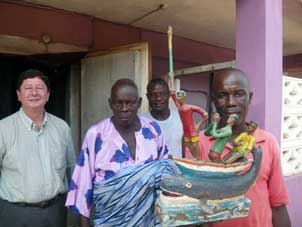
The United States Agency for International Development (USAID) has awarded a $24 million grant to the Coastal Resources Center (CRC) at the University of Rhode Island’s Graduate School of Oceanography to lead a five-year sustainable fisheries project in Ghana, West Africa. The grant is the largest in URI history.
The objective of the USAID/Ghana Sustainable Fisheries Management Project is to rebuild key marine fisheries stocks through responsible fishing practices.

“This will be a very challenging and ambitious project. If successful, our work with the Ghana Ministry of Fisheries and Aquaculture Development will reverse the trend in declining fish catches,” said Brian Crawford, who will move to Accra, Ghana to lead the project for URI. “With improved management, tens of thousands of metric tons of high-quality, low-cost fish protein supply can be recovered, benefiting not only tens of thousands of fishermen and women processors, but improving food security for millions of people in Ghana and its neighbors in West Africa.”
The project is part of USAID’s Feed the Future Initiative and will meet the government of Ghana’s fisheries development objectives. Working closely with the Ministry of Fisheries and Aquaculture Development and the Ghana Fisheries Commission, the project seeks to end overfishing of stocks important to local food security. It will accomplish this by working to ensure a legal framework exists for adoption of management plans that give use rights to the fishermen/women; ensuring decisions affecting fisheries and ecosystems are based on strong science; and widely communicating knowledge and information that educates the public and policy makers, so that support for lasting change emerges.
More than 100,000 men and women involved in the local fishing industry are expected to benefit from this project. Included will be tens of thousands of women involved in the processing and marketing of smoked fish.
“We are very proud of CRC and its outstanding record of outreach and education,” said Bruce Corliss, dean of the Graduate School of Oceanography. “The center does outstanding work on coastal policy and planning, both in Rhode Island and abroad, and this award demonstrates the confidence USAID has in CRC’s performance and its international leadership in this field.”
In leading this project, CRC will work with a consortium of international and local partners, including SNV Netherlands Development Organization, SSG Advisors, Hen Mpoano, Friends of the Nation, the Central & Western Fish Mongers Improvement Association in Ghana, Daasgift Quality Foundation, Development Action Association, and Spatial Solutions.
Included in project activities will be efforts to reduce child labor and trafficking in the fisheries sector in the Central Region of Ghana. The project also includes a university strengthening component with the University of Cape Coast to improve their applied research and extension services in coastal and fisheries management.
URI Leads EPA on Tour of Climate Change Frontlines
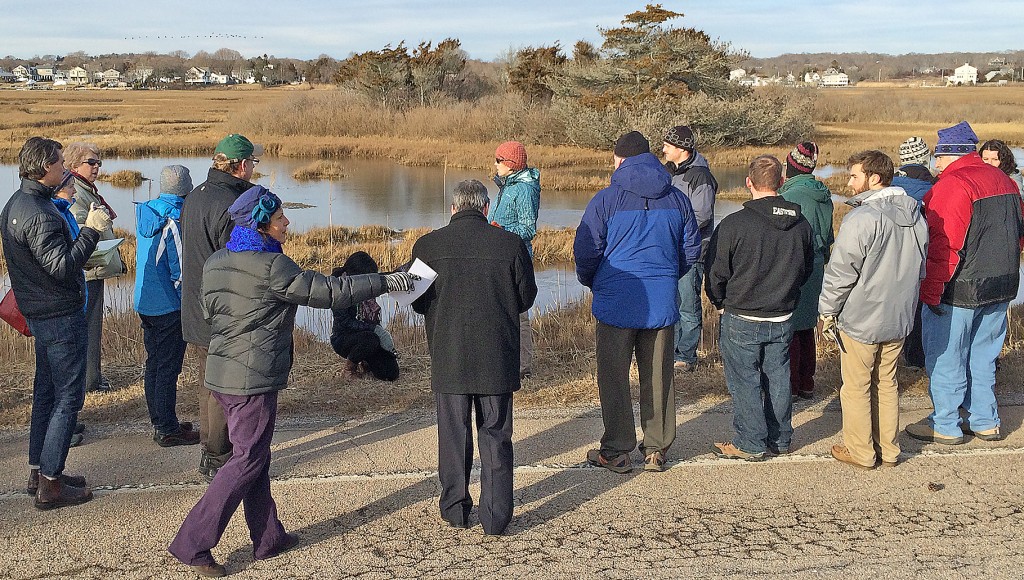
The U.S. Environmental Protection Agency’s New England Region Administrator Curt Spaulding and several of his colleagues spent two days this week touring Rhode Island to see the firsthand effects of climate change and sea level rise and to learn what municipalities, the state, URI and local organizations are doing about them. CRC and Rhode Island Sea Grant, who have collaborated with partners to address these issues, hosted the tour.
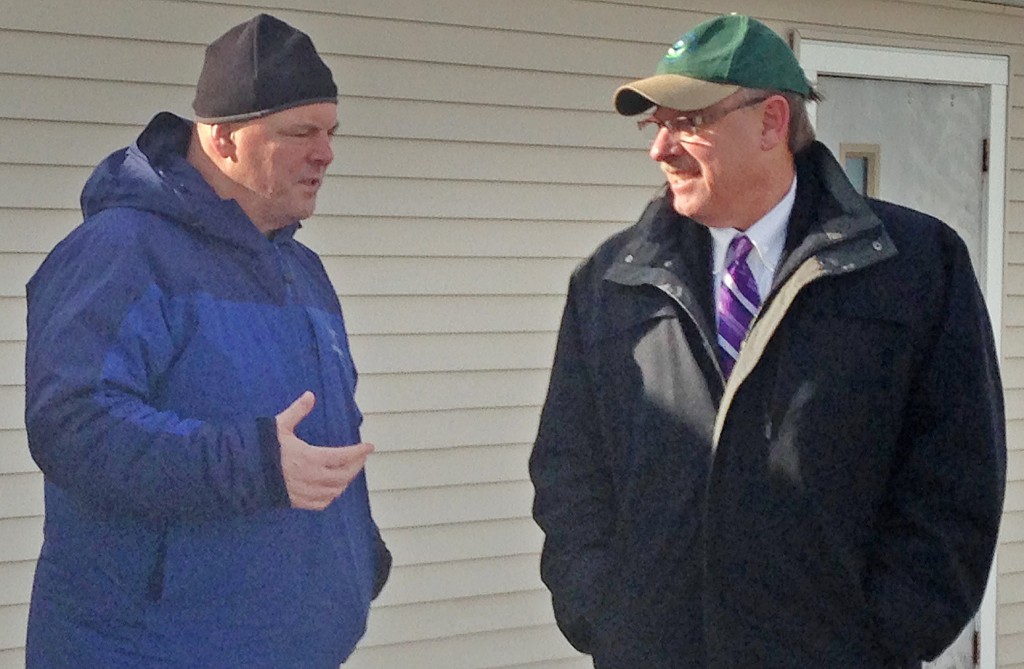
Spaulding and his colleagues saw vivid impacts of increasingly frequent and intense storms Thursday when touring the Misquamicut section of Westerly, which was hit hard by Superstorm Sandy in 2012. Since then some shoreline homes have been elevated or moved, and some businesses have chosen to scale back.
CRC and its partners were able to share how the state’s tools for taming the impacts of climate change can be applied in other New England locations, such as improving coastal management policy and planning tools to better address flooding and erosion from climate change and seal level rise. Examples include the Sea Level Affecting Marshes Model (SLAMM) for predicting changes in coastal wetlands and StormTools, which gives users interactive, detailed maps that illustrate sea level rise and storm surge flooding scenarios.
News reports on the visit were featured on Rhode Island Public Radio and in The Providence Journal.
Ghanaian Fisheries Experts Visit URI to Study Outreach Models
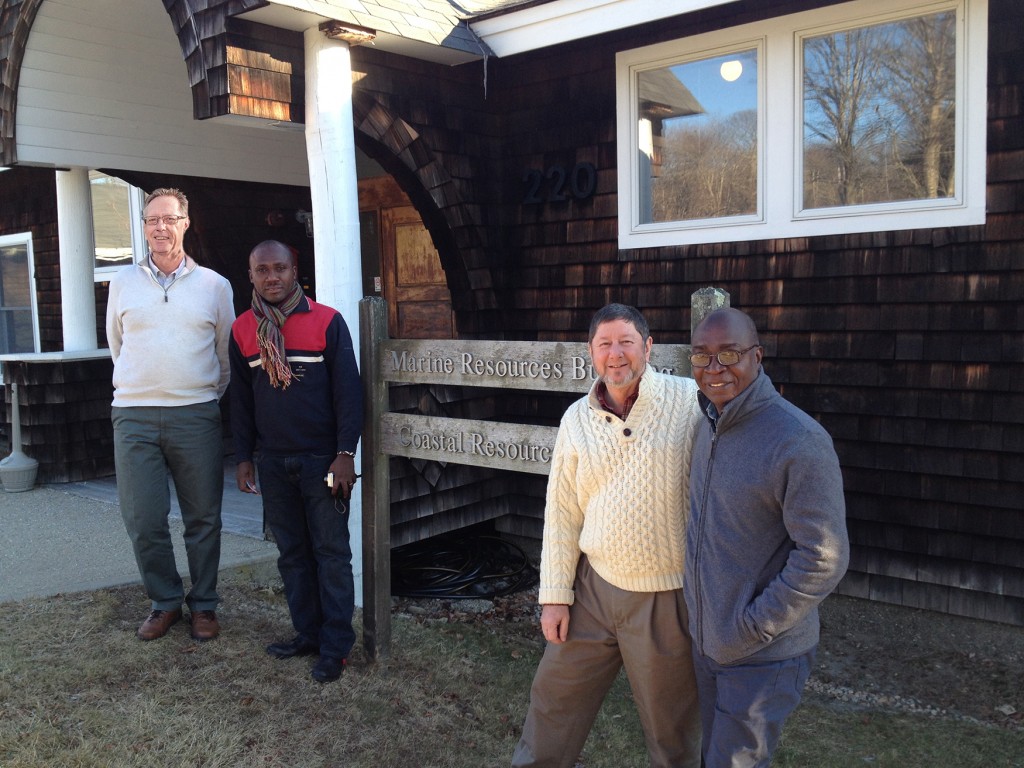
Fisheries experts Dr. Denis Worlanyo Aheto and Dr. John Blay of the University of Cape Coast (UCC) in Ghana braved the snow and cold to travel to URI in early January to study models of integrated coastal management and outreach programs and to foster research cooperation and learning opportunities for students at both universities.
“Our primary objective is to look at the various models for how universities can support capacity building in fisheries and coastal management,” said Aheto, head of the department of Fisheries and Aquatic Sciences at UCC and project manager at UCC’s new Centre for Coastal Management, funded by the United States Agency for International Development (USAID). Fisheries capacity building, research and extension are at the core of the center’s mission, said Blay, UCC fisheries professor and coordinator of the new center, and URI and Rhode Island are leaders in those areas.
The Coastal Resources Center (CRC) at URI’s Graduate School of Oceanography hosted the men for a week as part of CRC’s USAID/Ghana Sustainable Management Fisheries Project (SFMP). Aheto and Blay held discussions with faculty and top administrators across URI, met with members of the Commercial Fisheries Research Foundation and Save the Bay, visited National Oceanic and Atmospheric Administration and Department of Environmental Management offices and learned about Rhode Island Sea Grant’s extension and outreach work. “The Sea Grant model is fantastic,” Blay said.
“The role of the state is very strong in driving research in fisheries (in Rhode Island),” Aheto observed. “We would like to adapt this to the situation in coastal Ghana.” They said the URI and Sea Grant experiences have provided them with a framework for addressing the challenge of bringing the government of Ghana on board in terms of commitment and funding for fisheries and coastal management and overcoming the lack of connection among organizations. “That is really the issue (in Ghana), the need to establish a strong connection. There is too large a gulf between the university, the government and the fishermen,” Aheto said.
“The Commercial Fisherman’s Research Foundation is very interesting” in its strong connections to URI and fisheries research, Blay said. “In Ghana the fishermen are not seeing the university as a resource.” That lack of integration translates to a lack of support for university research, the men say, and they want to change that.
Aheto said Rhode Island and Ghana do share similarities when it comes to fisheries and coastal management. “We have the building blocks of a good system in place. We have UCC; we have a ministry of fisheries; we have fishermen’s organizations. The structure is in place, the problem is to bring up the capacity of the people in these institutions.”
Developing that capacity is where the role of URI is particularly important. One of the goals of the five-year SFMP initiative is to strengthen UCC’s fisheries and coastal management department by hosting up to 10 masters and doctoral students from UCC at URI, sponsoring other student and faculty exchanges, conducting joint research and holding a fisheries leadership course in Ghana that draws on URI’s experiences.
Such capacity building already is underway. Next month UCC students begin SFMP fieldwork in two estuary areas in Ghana, said Najih Lazar who is transitioning from the URI Fisheries Center to join SFMP in Ghana as fisheries advisor. “We will focus on applied research, working directly with two communities. UCC students will collect data from fishermen and exchange information with them,” explained Lazar.
Back in Ghana, Blay and Aheto will share what they have learned with their colleagues and counterparts in the government and make their case for outreach and integration. “We are going to make ourselves relevant through discussions with government and fishers and get the dialogue going,” Blay said.
UCC’s Center for Coastal Management already is gaining momentum, they said. The fisheries and coastal management department has bought three vehicles that will allow its 50 undergraduates and 20 graduate students access to field sites for research, and laboratories are getting new equipment and renovation. “We are like new kids on the block. There is much to be excited about,” Aheto said.
Partners Emphasize Cooperation, Collaboration at Ghana SFMP Meeting
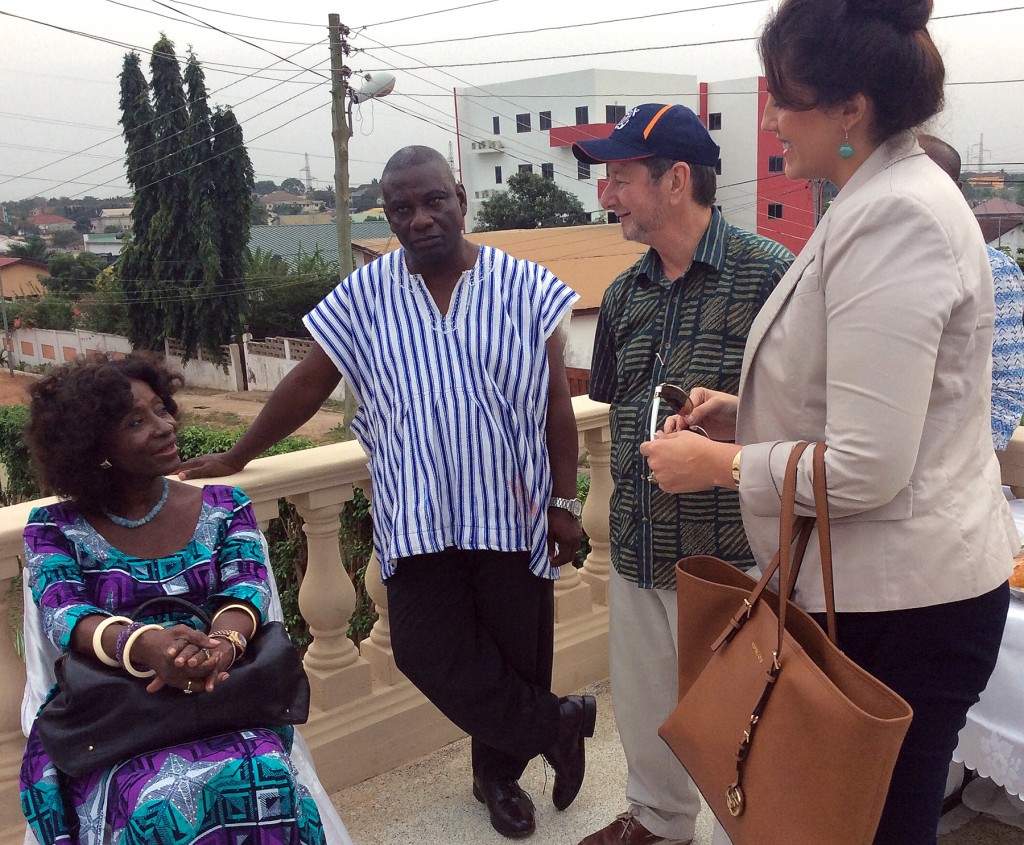
More than 40 members from the nine local and international partners implementing the USAID/Ghana Sustainable Fisheries Management Project (SFMP) were joined by USAID and Government of Ghana officials at a retreat in Accra, Ghana, Feb. 25 and 26 that combined fruitful discussions, technical presentations, role-playing and sharing of knowledge and expertise.
Ghana’s Minister of Fisheries and Aquaculture Development, Hanny-Sherry Ayitey, and other ministry officials attended a reception at SFMP’s Accra office following the retreat.
CRC is the lead implementer of the project, and the center’s Brian Crawford and Najih Lazar have relocated to Ghana as SFMP’s chief of party and national fisheries manager, respectively.
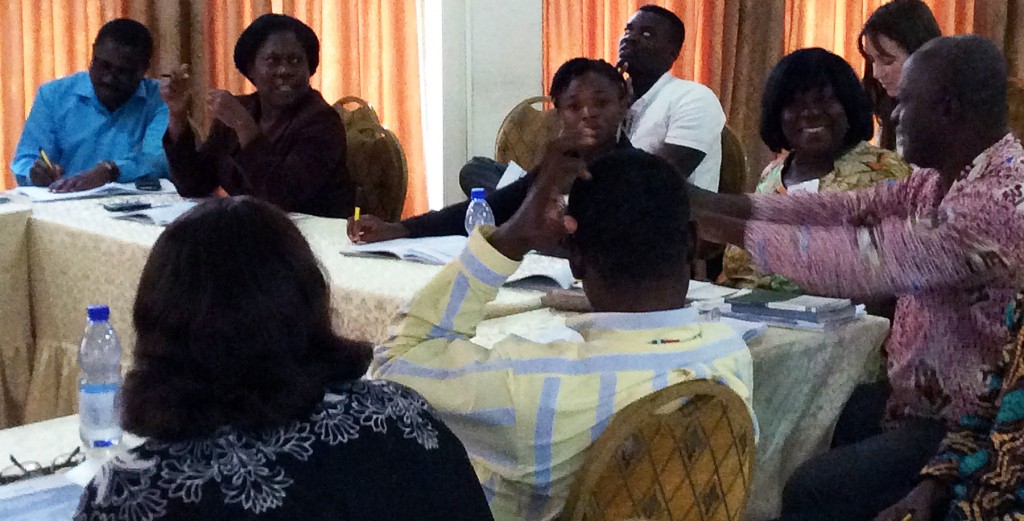
Objectives of the meetings were to understand better the marine fisheries context and other donor projects supporting Ghana’s sustainable fisheries efforts, to foster teamwork and activity execution and to understand policies, procedures and requirements of the five-year project. SFMP’s main objective is to rebuild Ghana’s collapsing fisheries stocks, with an initial focus on small pelagics—a key food and protein source throughout the region that is critical to Ghana’s food security. In this way, SFMP contributes to USAID/Feed the Future, the U.S. government’s global hunger and food security initiative.
Officials and participants acknowledged that the team has a demanding and large task before it, with difficult decisions and measures ahead. Officials and project leaders stressed that coordination and cooperation are integral to project success, particularly given the number of partners and activities. Key SFMP activities include improving legal conditions for implementing fisheries co-management, use rights and effort-reduction strategies; enhancing information systems and science-based decision-making and increasing public support and political will needed to make hard choices and change behavior. These components feed into applied management initiatives for targeted fisheries ecosystems.
Rhode Island-based CRC staff Donald Robadue, SFMP project manager; Cindy Moreau, CRC business manager; and Carol McCarthy, CRC communications specialist, traveled to Ghana to participate in the retreat. Partners embraced the spirit of collaboration solidified in the meetings and immediately got to work the next day in more informal, activity-focused meetings at SFMP’s Accra office.
Ice Pilot Project Tests Impact on Gambian Sole Fisheries
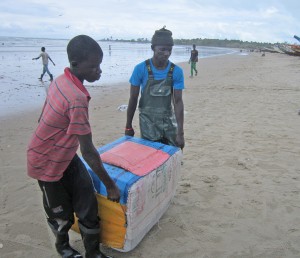
The Coastal Resources Center at the University of Rhode Island (URI) Graduate School of Oceanography, together with the National Sole Fishery Co-management Committee (NASCOM) in The Gambia, has launched a pilot project aimed at reducing post-harvest loss of sole at-sea. URI’s College for the Environment and Life Sciences fisheries center provided its expertise as well. The project is supported by a grant from the Rockefeller Foundation.
The project’s key objective is to determine if the use of ice and ice boxes aboard fishing vessels will reduce post-harvest economic losses at sea, improve the quality of sole harvested and deliver economic benefits throughout the supply chain of this export commodity. A traceability process also is being field-tested in parallel with the project. Both efforts aim to strengthen sustainability of the sole fishery, which is seeking Marine Stewardship Council certification.
From design to implementation, the project has involved multiple stakeholders, including fishermen, buyers, processors and exporters. Kaufland, a large retailer based in Europe that donated funds to NASCOM to support the move towards sustainability, also supports the project. NASCOM is used some of those funds to provide ice boxes to sole fishermen taking part in the study.
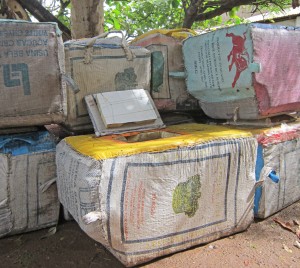
Learning from a six-week pilot implemented at two landing sites—Brufut and Gunjur —will inform changes in productivity and potentially could reveal added benefits across the value chain. The study will end in mid-September, but the efforts toward improving the fishery for all stakeholders will continue.
CRC will provide an update on the pilot project’s findings following its conclusion in September.
CRC Leads Fisheries Course in Bangladesh
CRC and URI Fisheries Center staff joined partners on the Enhanced Coastal Fisheries (ECOFISHBD) project in Barisal, Bangladesh, to conduct a three-week fisheries stock-assessment training course in June.
CRC project manager Jim Tobey and Kathy Castro and Barbara Somers of URI’s Fisheries Center led the training course for 30 Bangladesh fisheries professionals.
The program combined classroom work with one-on-one instruction and fieldwork that also engaged local fishing community members. “This was the first trip for us to Bangladesh. We had prepared extensively by collecting all available published information about the hilsa fisheries, stock assessment and fish biology,” Castro said.
The program consisted of morning classroom sessions, followed by computer work in the afternoon. Halfway through the course, participants worked on an applied problem to help them synthesize knowledge and understand applications.
Adapting to the differing skill levels and backgrounds of the students, Tobey, Castro and Somers adjusted their teaching methods and supplemented classroom lectures with additional integrated hands-on experience and field sessions.
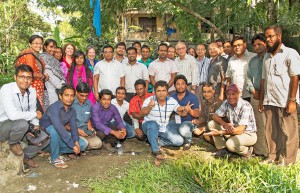
They also had to overcome logistical challenges that included power outages and flooding in the classroom building after heavy rains. Despite the challenges, participants gave the course positive marks, finding particular value in the one-on-one attention and seeking a follow-up refresher to retain and build on their skills.
CRC is a sub-grantee of ECOFISHBD , five-year initiative of USAID, WorldFish and the Government of Bangladesh that supports coastal capture fishing communities and other ecosystem users and key stakeholders to improve the resilience of the Meghna River estuarine ecosystem and the livelihoods it supports. ECOFISHBD aims to improve science-based fisheries decision-making; strengthen fisheries adaptive co-management; and enhance the socio-economic resilience of hilsa fishing communities.



